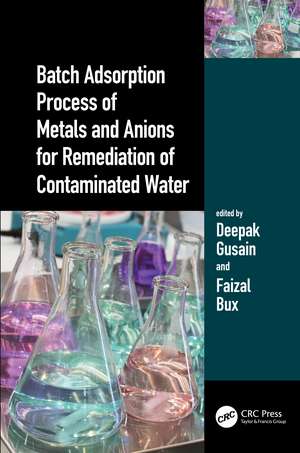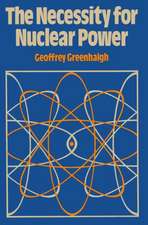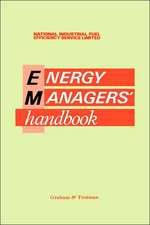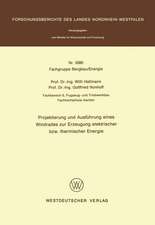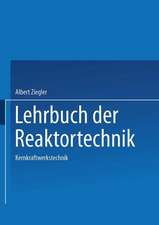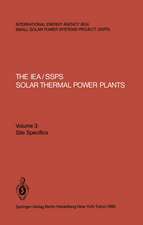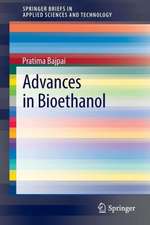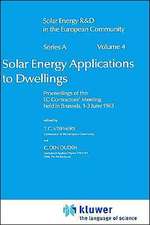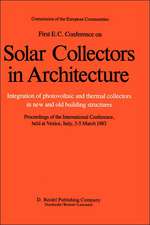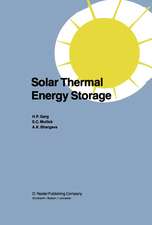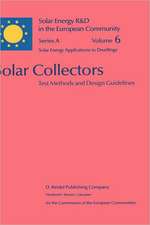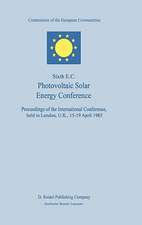Batch Adsorption Process of Metals and Anions for Remediation of Contaminated Water
Editat de Deepak Gusain, Faizal Buxen Limba Engleză Hardback – 18 mar 2021
Key Features:
- Provides practitioners with the background they need to understand and apply batch adsorption processes to the purification of water
- Describes the actions of adsorption capacity or percentage removal with respect to factors affecting the adsorption process
- Excellent source of information for those working in the industry for remediation of metals and anions
- Discusses the current era of Anthropocene which is highly dependent on the anthropogenic mineral sources for its sustenance
| Toate formatele și edițiile | Preț | Express |
|---|---|---|
| Paperback (1) | 420.55 lei 6-8 săpt. | |
| CRC Press – 26 aug 2024 | 420.55 lei 6-8 săpt. | |
| Hardback (1) | 1279.05 lei 6-8 săpt. | |
| CRC Press – 18 mar 2021 | 1279.05 lei 6-8 săpt. |
Preț: 1279.05 lei
Preț vechi: 1559.82 lei
-18% Nou
Puncte Express: 1919
Preț estimativ în valută:
244.74€ • 255.53$ • 202.56£
244.74€ • 255.53$ • 202.56£
Carte tipărită la comandă
Livrare economică 04-18 aprilie
Preluare comenzi: 021 569.72.76
Specificații
ISBN-13: 9780367436483
ISBN-10: 0367436485
Pagini: 330
Ilustrații: 24 Tables, black and white; 14 Illustrations, black and white
Dimensiuni: 156 x 234 x 19 mm
Greutate: 0.64 kg
Ediția:1
Editura: CRC Press
Colecția CRC Press
ISBN-10: 0367436485
Pagini: 330
Ilustrații: 24 Tables, black and white; 14 Illustrations, black and white
Dimensiuni: 156 x 234 x 19 mm
Greutate: 0.64 kg
Ediția:1
Editura: CRC Press
Colecția CRC Press
Public țintă
Academic, Postgraduate, Professional, and Professional Practice & DevelopmentCuprins
Contents
Acknowledgement.....................................................................................................vii
List of Abbreviations.................................................................................................ix
Editors..................................................................................................................... xiii
Contributors..............................................................................................................xv
Chapter 1 Introduction...........................................................................................1
Deepak Gusain, Shikha Dubey, Yogesh Chandra Sharma and Faizal Bux
Chapter 2 Adsorbents: Classification, Characteristics, Chemical Nature,
and Interaction with Contaminants.......................................................9
Shikha Dubey, Deepak Gusain, Yogesh Chandra Sharma and Faizal Bux
Chapter 3 Impact of Factors on Remediation of Major Toxic Elements
(Vanadium, Chromium, Nickel, Arsenic, Strontium, Cadmium,
Mercury, Lead, Uranium) Via Batch Adsorption Process.................. 41
Deepak Gusain, Shikha Dubey, Yogesh Chandra Sharma and Faizal Bux
Chapter 4 Remediation of Essential Elements Exerting Toxicity on
Excessive Exposure (Mn, Co, Cu, Zn, Se) Via Batch Adsorption
in Response to Variable Factors and Elucidation of the
Mechanism for the Batch Adsorption Process.................................. 133
Deepak Gusain, Shikha Dubey, Yogesh Chandra Sharma, and Faizal Bux
Chapter 5 Impact of Factors on Remediation of Miscellaneous (Fe, Cs)
and Nontoxic Elements (Sc, Ti, Ga, Ge) Via Batch
Adsorption Process........................................................................... 183
Deepak Gusain, Shikha Dubey, Yogesh Chandra Sharma, and Faizal Bux
Chapter 6 Impact of Factors on Remediation of Anions (Fluoride,
Nitrate, Perchlorate, and Sulfate) Via Batch Adsorption Processes............... 201
Deepak Gusain, Shikha Dubey, Yogesh Chandra Sharma and Faizal Bux
Chapter 7 Impact of Initial Concentration, Adsorbent Dose, and Ionic
Strength on Batch Adsorption of Metals and Anions and
Elucidation of the Mechanism........................................................... 239
Deepak Gusain, Shikha Dubey, Yogesh Chandra Sharma, and Faizal Bux
Chapter 8 Kinetic, Isotherm, and Thermodynamic Studies for Batch
Adsorption of Metals and Anions, and Management of
Adsorbents after the Adsorption Process..........................................249
Deepak Gusain, Shikha Dubey, Yogesh Chandra Sharma, and Faizal Bux
References..............................................................................................................269
Index....................................................................................................................... 313
Acknowledgement.....................................................................................................vii
List of Abbreviations.................................................................................................ix
Editors..................................................................................................................... xiii
Contributors..............................................................................................................xv
Chapter 1 Introduction...........................................................................................1
Deepak Gusain, Shikha Dubey, Yogesh Chandra Sharma and Faizal Bux
Chapter 2 Adsorbents: Classification, Characteristics, Chemical Nature,
and Interaction with Contaminants.......................................................9
Shikha Dubey, Deepak Gusain, Yogesh Chandra Sharma and Faizal Bux
Chapter 3 Impact of Factors on Remediation of Major Toxic Elements
(Vanadium, Chromium, Nickel, Arsenic, Strontium, Cadmium,
Mercury, Lead, Uranium) Via Batch Adsorption Process.................. 41
Deepak Gusain, Shikha Dubey, Yogesh Chandra Sharma and Faizal Bux
Chapter 4 Remediation of Essential Elements Exerting Toxicity on
Excessive Exposure (Mn, Co, Cu, Zn, Se) Via Batch Adsorption
in Response to Variable Factors and Elucidation of the
Mechanism for the Batch Adsorption Process.................................. 133
Deepak Gusain, Shikha Dubey, Yogesh Chandra Sharma, and Faizal Bux
Chapter 5 Impact of Factors on Remediation of Miscellaneous (Fe, Cs)
and Nontoxic Elements (Sc, Ti, Ga, Ge) Via Batch
Adsorption Process........................................................................... 183
Deepak Gusain, Shikha Dubey, Yogesh Chandra Sharma, and Faizal Bux
Chapter 6 Impact of Factors on Remediation of Anions (Fluoride,
Nitrate, Perchlorate, and Sulfate) Via Batch Adsorption Processes............... 201
Deepak Gusain, Shikha Dubey, Yogesh Chandra Sharma and Faizal Bux
Chapter 7 Impact of Initial Concentration, Adsorbent Dose, and Ionic
Strength on Batch Adsorption of Metals and Anions and
Elucidation of the Mechanism........................................................... 239
Deepak Gusain, Shikha Dubey, Yogesh Chandra Sharma, and Faizal Bux
Chapter 8 Kinetic, Isotherm, and Thermodynamic Studies for Batch
Adsorption of Metals and Anions, and Management of
Adsorbents after the Adsorption Process..........................................249
Deepak Gusain, Shikha Dubey, Yogesh Chandra Sharma, and Faizal Bux
References..............................................................................................................269
Index....................................................................................................................... 313
Notă biografică
Dr Deepak Gusain is an assistant professor in the Department of Environmental
Studies in PGDAV (Evening) College, University of Delhi. He earned his master’s
degree in environmental studies from the University of Delhi and completed his
Ph.D. at the Department of Chemistry, Indian Institute of Technology (Banaras
Hindu University), Varansiin Varanasi, followed by a postdoctoral fellowship at the
Institute for Water and Wastewater Technology in Durban University of Technology.
His Ph.D. research focused on the remediation of chromium and cadmium from
aqueous solution using nanocrystalline material. In addition, he investigated the
effect of linear and nonlinear curve fitting on the estimation of isotherm and kinetic
and thermodynamic parameters during the adsorption process.
Professor Faizal Bux is a professor and director of the Institute for Water and
Wastewater Technology, Durban University of Technology. His affiliations also
include Fellow of the International Water Association, Royal Society of Chemistry,
and Water Institute of Southern Africa and he is a member of the Academy of Science
of South Africa. He has won several national and international awards and published
extensively. Professor Faizal Bux’s group works on wastewater treatment and reuse,
wastewater beneficiation, and health-related microbiology, bioremediation, algal biotechnology,
and constructed wetlands.
Studies in PGDAV (Evening) College, University of Delhi. He earned his master’s
degree in environmental studies from the University of Delhi and completed his
Ph.D. at the Department of Chemistry, Indian Institute of Technology (Banaras
Hindu University), Varansiin Varanasi, followed by a postdoctoral fellowship at the
Institute for Water and Wastewater Technology in Durban University of Technology.
His Ph.D. research focused on the remediation of chromium and cadmium from
aqueous solution using nanocrystalline material. In addition, he investigated the
effect of linear and nonlinear curve fitting on the estimation of isotherm and kinetic
and thermodynamic parameters during the adsorption process.
Professor Faizal Bux is a professor and director of the Institute for Water and
Wastewater Technology, Durban University of Technology. His affiliations also
include Fellow of the International Water Association, Royal Society of Chemistry,
and Water Institute of Southern Africa and he is a member of the Academy of Science
of South Africa. He has won several national and international awards and published
extensively. Professor Faizal Bux’s group works on wastewater treatment and reuse,
wastewater beneficiation, and health-related microbiology, bioremediation, algal biotechnology,
and constructed wetlands.
Descriere
Adsorption is one of the method that is in use for remediation of contaminated water. In addition, anions like nitrate, perchlorate and sulphate as water contaminants are considered. This unique volume fills a niche in the area of water treatment.
